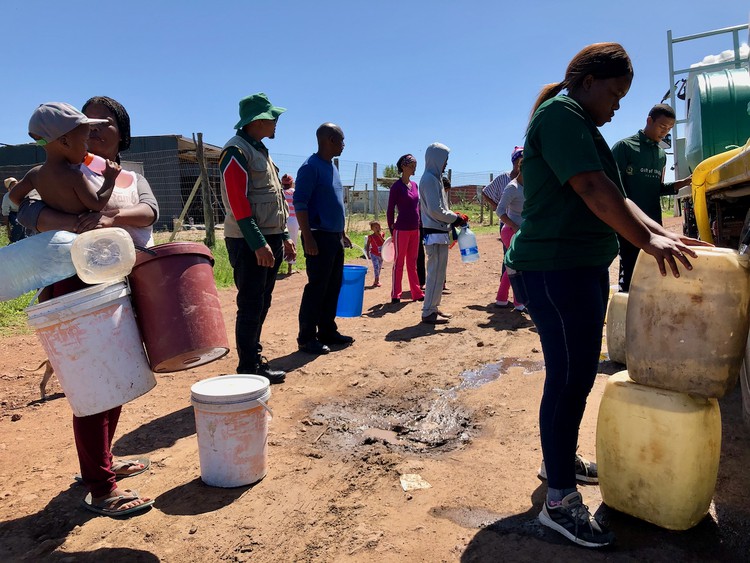
Makhanda residents collect water from a Gift of the Givers water tanker in March this year. Archive photo: Lucas Nowicki
29 April 2020
Relief for Makhanda, Eastern Cape, which has been experiencing a water crisis for the last two years, may be further delayed.
The water crisis has been caused by the neglect of water supply infrastructure by Makana Municipality combined with four years of drought. Now, upgrades to aging water-supply and sanitation infrastructure could be further delayed, after the Department of Human Settlements, Water and Sanitation decided to shift over R306 million from its budget for bulk water and sanitation projects to fund its Covid-19 emergency response plan, according to a report submitted by the department to Parliament last week.
The national department’s Covid-19 response plan is focused on immediate relief measures, delivering and refilling over 18,000 Jojo tanks across the country. To pay for this plan, the National Treasury has allowed the department to reallocate the funds from the 2019/20 Regional Bulk Infrastructure Grant (RBIG). This will delay around 50 bulk water and sanitation projects across the country, one of these being the upgrade of James Kleynhans Treatment Works in Makana.
The upgrade to the treatment works, which would enable it to supply enough water to the entire area, effectively ending the water supply crisis in the municipality, was due to be completed in 2021.
But the department is reallocating R22 million of the total annual R66 million budget for the James Kleynhans upgrade. It is also reallocating funds from upgrades to the Makana Bulk Sewer and the Mayfield Waste Water Treatment Works, which are ongoing upgrades to the municipality’s dilapidated sewage infrastructure.
“The RBIG projects earmarked to be completed during the financial year 2020/21 and subsequent years will be delayed, naturally delaying the impact to the community the grant is meant to service,” says the department in its report.
Philip Machanick, chairperson of the Grahamstown Residents Association, says that this is an unsustainable approach. “The JK (James Kleynhans Treatment Works) project should be a high priority, because completing it reduces the need for Jojo tanks. It does not promote social distancing and infection-limiting hygiene if people do not have reliable running water in your home … Collapsing sewage infrastructure is the last thing you need in a public health crisis,” said Machanick.
The R306 million reprioritised for the Covid-19 response plan will include water tanks (about R100 million), the filling up of these water tanks (about R104 million), provision for the installation of the tanks, personal protective equipment, and about R40 million for VAT.
The Department said it needed a further R830 million for Covid-19 interventions, and was in the process of getting approval from the Treasury to relocate more funds to relief measures.
Yoliswa Ramokolo, spokesperson for the Makana municipality, has complained about this story to News24 (who republished it). In her complaint, she wrote that the lockdown process has delayed the James Kleynhans upgrade project.
“[The] Covid-19 lockdown process reduces the pace of work per day per month per year of the project duration [for financial year 2020/21] and that has resulted in a reduction of the cost of the project,” she wrote. “It is anticipated that this state of disaster can last for the remainder of 2020. This will mean the project progress in the financial year July 2020 to June 2021 will be slow and less work will be achieved.”
This applies to every heavy labour project, Ramokolo said.
“This means that less money will be needed … R22 million or more stands not to be used as initially planned. This amount … is then reprioritised to combat the virus instead of just staying in the bank.”
In other words Ramokolo is saying that it is not the reallocation of funds that has delayed the project; it’s the Covid-19 lockdown that has prevented work from being carried out, and consequently the funds will not be used and therefore need to be reallocated elsewhere.
The headline of this story was changed after publication.